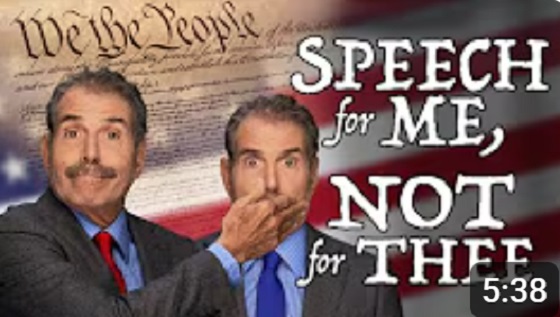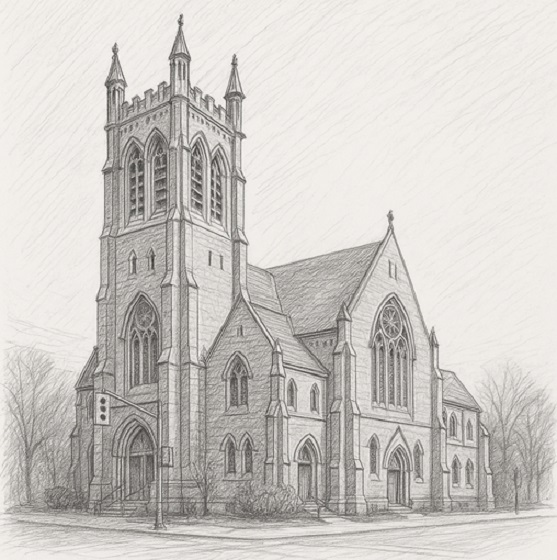Censorship Industrial Complex
Who tries to silence free speech? Apparently who ever is in power.

Now that Trump is running Washington, Conservative thinkers must ponder a new-found appreciation for silencing speech they don’t like.
From StosselTV
War on Words: Both Parties Try to Silence Speech They Don’t Like
Donald Trump, before he was reelected, said he’d end government censorship. But now that he’s in office? He calls speech he doesn’t like “illegal.”
Free Speech should be a bedrock American value, no matter who’s in office. After the murder of Charlie Kirk, Republicans, who once complained about censorship, became censors. Democrats suddenly flip-flopped. All politicians should remember, the way to fight speech you don’t like, is with more speech, not censorship.
After 40+ years of reporting, I now understand the importance of limited government and personal freedom.
——————————————
Libertarian journalist John Stossel created Stossel TV to explain liberty and free markets to young people.
Prior to Stossel TV he hosted a show on Fox Business and co-anchored ABC’s primetime newsmagazine show, 20/20.
Stossel’s economic programs have been adapted into teaching kits by a non-profit organization, “Stossel in the Classroom.” High school teachers in American public schools now use the videos to help educate their students on economics and economic freedom. They are seen by more than 12 million students every year.
———
To make sure you receive the weekly video from Stossel TV, sign up here: https://www.johnstossel.com/#subscrib…
———
Censorship Industrial Complex
Canada’s privacy commissioner says he was not consulted on bill to ban dissidents from internet

From LifeSiteNews
Privacy Commissioner Philippe Dufresne that there was no consultation on Bill C-8, which is touted by Liberals as a way to stop ‘unprecedented cyber-threats.’
Canada’s Privacy Commissioner admitted that he was never consulted on a recent bill introduced by the Liberal government of Prime Minister Mark Carney that became law and would grant officials the power to ban anyone deemed a dissident from accessing the internet.
Privacy Commissioner Philippe Dufresne said last week that in regard to Bill C-8, titled “An Act respecting cyber security, amending the Telecommunications Act and making consequential amendments to other Acts,” that there was no consultation.
“We are not consulted on specific pieces of legislation before they are tabled,” he told the House of Commons ethics committee, adding, “I don’t want privacy to be an obstacle to transparency.”
Bill C-8, which is now in its second reading in the House of Commons, was introduced in June by Minister of Public Safety Gary Anandasangaree and has a provision in which the federal government could stop “any specified person” from accessing the internet.
All that would be needed is the OK from Minister of Industry Mélanie Joly for an individual to be denied internet service.
The federal government under Carney claims that the bill is a way to stop “unprecedented cyber-threats.”
The bill, as written, claims that the government would need the power to cut someone off from the internet, as it could be “necessary to do so to secure the Canadian telecommunications system against any threat, including that of interference, manipulation, disruption, or degradation.”
While questioning Dufresne, Conservative MP Michael Barrett raised concerns that no warrant would be needed for agents to go after those officials who want to be banned from the internet or phone service.
“Without meaningful limits, bills like C-8 can hand the government secret, warrantless powers over Canadians’ communications,” he told the committee, adding the bill, as written is a “serious setback for privacy,” as well as a “setback for democracy.”
Barrett asked if the goal of the bill is for Parliament to be granted “sweeping powers of surveillance to the government without a formal review?
Dufresne said, “It’s not a legal obligation under the Privacy Act.”
Experts have warned that Bill C-8 is flawed and must be “fixed.”
The Canadian Civil Liberties Association (CCLA) blasted the bill as troublesome, saying it needs to “fix” the “dangerous flaws” in the bill before it becomes law.
“Experts and civil society have warned that the legislation would confer ministerial powers that could be used to deliberately or inadvertently compromise the security of encryption standards within telecommunications networks that people, governments, and businesses across Canada rely upon, every day,” the CCLA wrote in a recent press release.
Canada’s own intelligence commissioner has warned that the bill, if passed as is, would potentially not be constitutionally justified, as it would allow for warrantless seizure of a person’s sensitive information.
Since taking power in 2015, the Liberal government has brought forth many new bills that, in effect, censor internet content as well as go after people’s ability to speak their minds.
Recently, Canadian Conservative Party MP Leslyn Lewis blasted another new Liberal “hate crime” bill, calling it a “dangerous” piece of legislation that she says will open the door for authorities to possibly prosecute Canadians’ speech deemed “hateful.”
She also criticized it for being silent regarding rising “Christian hate.”
Censorship Industrial Complex
Winnipeg Universities Flunk The Free Speech Test

From the Frontier Centre for Public Policy
By Tom Flanagan
Frances Widdowson faced mob hostility for saying unmarked graves have yet to be proven
Dr. Frances Widdowson’s visit to Winnipeg on Sept. 25 and 26 should have been an opportunity for debate. Instead, the city’s universities endorsed a statement that undermines academic freedom.
Widdowson, a political scientist known for questioning official narratives about residential schools, came to meet students who wanted to ask about claims of “unmarked graves.” Those claims, which became national headlines in 2021 after ground-penetrating radar surveys at former school sites, remain unproven because no physical evidence of burials has been found.
For many Canadians, the claims of “unmarked graves” were a shocking revelation, given how widely the story was reported as a settled fact.
That context alone should have been enough to spark discussion. Instead, the University of Manitoba and the University of Winnipeg joined the Assembly of Manitoba Chiefs in issuing a statement that should embarrass both schools. At institutions dedicated to study and inquiry, the instinct should be to ask more questions, not to shut them down.
At first, the statement sounded reasonable. It said the universities did not “condone violence or threats to anyone’s safety.” But that did not stop Widdowson from being roughed up by a mob at the University of Winnipeg. It would be refreshing if the universities condemned mob violence with the same urgency they condemned a professor answering questions. Their silence sends its own message about which kind of behaviour is tolerated on campus.
The bigger problem is the statement’s claim that there is a single “truth” about residential schools, known to “survivors,” and that questioning it amounts to “denial.” In reality, 143 residential schools operated with federal support for more than a century. What happened varied widely from place to place and decade to decade.
That is a subject for historical research, grounded in evidence and debate, not pronouncements about capital-T “Truth” issued by communications offices. Canadians deserve to know that history is still being studied, not declared untouchable.
Worse still was the statement’s promise to “press the Government of Canada to enact legislation that makes residential school denialism a crime.” The Assembly of Manitoba Chiefs is free to say what it wants. But universities lending their names to a demand that historical inquiry be criminalized is beyond misguided; it is dangerous.
Criminalizing “denialism” would mean that even challenging details of the residential school record could be punishable by law. Canadians should think carefully before accepting laws that turn historical debate into a criminal offence.
The University of Chicago’s widely praised statement on academic freedom puts it well: “the University’s fundamental commitment is to the principle that debate or deliberation may not be suppressed because the ideas put forth are thought by some or even by most members of the University community to be offensive, unwise, immoral, or wrong-headed. It is for the individual members of the University community, not for the University as an institution, to make those judgments for themselves.” That principle should also guide Canadian universities. Academic freedom is not a luxury; it is the foundation of higher education.
Worst of all, these positions were not even issued in the names of presidents or academic leaders. They were issued under “media relations.” Imagine being a serious scholar or scientist at one of these universities and discovering that the media office had taken a political stance on your behalf.
I know how I would feel: undermined as a professional and silenced as a citizen.
Tom Flanagan is a professor emeritus of political science at the University of Calgary and a Fellow of the Royal Society of Canada. He is a senior fellow at the Frontier Centre for Public Policy and co-editor of the best-selling book Grave Error: How the Media Misled Us (and the Truth about Residential Schools).
-

 Alberta2 days ago
Alberta2 days agoClick here to help choose Alberta’s new licence plate design
-

 National2 days ago
National2 days agoDemocracy Watch Renews Push for Independent Prosecutor in SNC-Lavalin Case
-

 Alberta2 days ago
Alberta2 days agoBusting five myths about the Alberta oil sands
-

 Frontier Centre for Public Policy2 days ago
Frontier Centre for Public Policy2 days agoOttawa Should Think Twice Before Taxing Churches
-

 Business1 day ago
Business1 day agoUS government buys stakes in two Canadian mining companies
-

 Health1 day ago
Health1 day agoNew report warns WHO health rules erode Canada’s democracy and Charter rights
-

 Energy1 day ago
Energy1 day agoMinus Forty and the Myth of Easy Energy
-

 Business5 hours ago
Business5 hours agoEmission regulations harm Canadians in exchange for no environmental benefit




